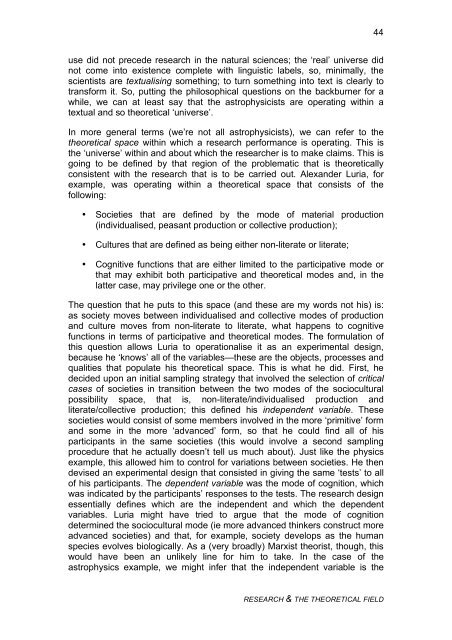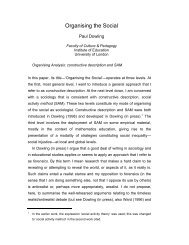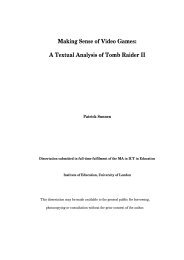Research and the Theoretical Field - Pauldowling.me
Research and the Theoretical Field - Pauldowling.me
Research and the Theoretical Field - Pauldowling.me
You also want an ePaper? Increase the reach of your titles
YUMPU automatically turns print PDFs into web optimized ePapers that Google loves.
44<br />
use did not precede research in <strong>the</strong> natural sciences; <strong>the</strong> ‘real’ universe did<br />
not co<strong>me</strong> into existence complete with linguistic labels, so, minimally, <strong>the</strong><br />
scientists are textualising so<strong>me</strong>thing; to turn so<strong>me</strong>thing into text is clearly to<br />
transform it. So, putting <strong>the</strong> philosophical questions on <strong>the</strong> backburner for a<br />
while, we can at least say that <strong>the</strong> astrophysicists are operating within a<br />
textual <strong>and</strong> so <strong>the</strong>oretical ‘universe’.<br />
In more general terms (we’re not all astrophysicists), we can refer to <strong>the</strong><br />
<strong>the</strong>oretical space within which a research performance is operating. This is<br />
<strong>the</strong> ‘universe’ within <strong>and</strong> about which <strong>the</strong> researcher is to make claims. This is<br />
going to be defined by that region of <strong>the</strong> problematic that is <strong>the</strong>oretically<br />
consistent with <strong>the</strong> research that is to be carried out. Alex<strong>and</strong>er Luria, for<br />
example, was operating within a <strong>the</strong>oretical space that consists of <strong>the</strong><br />
following:<br />
• Societies that are defined by <strong>the</strong> mode of material production<br />
(individualised, peasant production or collective production);<br />
• Cultures that are defined as being ei<strong>the</strong>r non-literate or literate;<br />
• Cognitive functions that are ei<strong>the</strong>r limited to <strong>the</strong> participative mode or<br />
that may exhibit both participative <strong>and</strong> <strong>the</strong>oretical modes <strong>and</strong>, in <strong>the</strong><br />
latter case, may privilege one or <strong>the</strong> o<strong>the</strong>r.<br />
The question that he puts to this space (<strong>and</strong> <strong>the</strong>se are my words not his) is:<br />
as society moves between individualised <strong>and</strong> collective modes of production<br />
<strong>and</strong> culture moves from non-literate to literate, what happens to cognitive<br />
functions in terms of participative <strong>and</strong> <strong>the</strong>oretical modes. The formulation of<br />
this question allows Luria to operationalise it as an experi<strong>me</strong>ntal design,<br />
because he ‘knows’ all of <strong>the</strong> variables—<strong>the</strong>se are <strong>the</strong> objects, processes <strong>and</strong><br />
qualities that populate his <strong>the</strong>oretical space. This is what he did. First, he<br />
decided upon an initial sampling strategy that involved <strong>the</strong> selection of critical<br />
cases of societies in transition between <strong>the</strong> two modes of <strong>the</strong> sociocultural<br />
possibility space, that is, non-literate/individualised production <strong>and</strong><br />
literate/collective production; this defined his independent variable. These<br />
societies would consist of so<strong>me</strong> <strong>me</strong>mbers involved in <strong>the</strong> more ‘primitive’ form<br />
<strong>and</strong> so<strong>me</strong> in <strong>the</strong> more ‘advanced’ form, so that he could find all of his<br />
participants in <strong>the</strong> sa<strong>me</strong> societies (this would involve a second sampling<br />
procedure that he actually doesn’t tell us much about). Just like <strong>the</strong> physics<br />
example, this allowed him to control for variations between societies. He <strong>the</strong>n<br />
devised an experi<strong>me</strong>ntal design that consisted in giving <strong>the</strong> sa<strong>me</strong> ‘tests’ to all<br />
of his participants. The dependent variable was <strong>the</strong> mode of cognition, which<br />
was indicated by <strong>the</strong> participants’ responses to <strong>the</strong> tests. The research design<br />
essentially defines which are <strong>the</strong> independent <strong>and</strong> which <strong>the</strong> dependent<br />
variables. Luria might have tried to argue that <strong>the</strong> mode of cognition<br />
determined <strong>the</strong> sociocultural mode (ie more advanced thinkers construct more<br />
advanced societies) <strong>and</strong> that, for example, society develops as <strong>the</strong> human<br />
species evolves biologically. As a (very broadly) Marxist <strong>the</strong>orist, though, this<br />
would have been an unlikely line for him to take. In <strong>the</strong> case of <strong>the</strong><br />
astrophysics example, we might infer that <strong>the</strong> independent variable is <strong>the</strong><br />
RESEARCH & THE THEORETICAL FIELD




